Mississippi Burning Blu-ray Movie
HomeMississippi Burning Blu-ray Movie 
Limited Edition to 3000 - SOLD OUTTwilight Time | 1988 | 127 min | Rated R | May 12, 2015
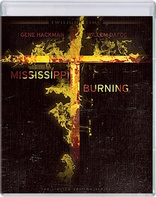
Movie rating
7.9 | / 10 |
Blu-ray rating
| Users | 4.0 | |
| Reviewer | 3.5 | |
| Overall | 3.7 |
Overview
Mississippi Burning (1988)
Two FBI agents with wildly different styles arrive in Mississippi to investigate the disappearance of some civil rights activists.
Starring: Gene Hackman, Willem Dafoe, Frances McDormand, Brad Dourif, R. Lee ErmeyDirector: Alan Parker (I)
| Thriller | Uncertain |
| Crime | Uncertain |
| Drama | Uncertain |
| Mystery | Uncertain |
Specifications
Video
Video codec: MPEG-4 AVC
Video resolution: 1080p
Aspect ratio: 1.85:1
Original aspect ratio: 1.85:1
Audio
English: DTS-HD Master Audio 2.0 (48kHz, 24-bit)
Music: DTS-HD Master Audio 2.0 (48kHz, 24-bit)
Subtitles
English SDH
Discs
50GB Blu-ray Disc
Single disc (1 BD)
Playback
Region free
Review
Rating summary
| Movie | 3.5 | |
| Video | 4.0 | |
| Audio | 4.0 | |
| Extras | 2.0 | |
| Overall | 3.5 |
Mississippi Burning Blu-ray Movie Review
Reviewed by Jeffrey Kauffman June 9, 2015Mississippi Burning, Alan Parker’s often devastating indictment of institutional racism, appears on Blu-ray when, sadly, several of the elements of its 1964 set plot seem newly relevant. Loosely based on the actual murder of three civil rights activists, Mississippi Burning may masquerade as a bristling police procedural, with two FBI agents trying to find out what happened to a trio of missing kids, but it’s the film’s potent portrayal of a kind of fetid Southern Gothic society that delivers the most visceral emotional impact. A neatly menacing Gene Hackman portrays FBI agent Rupert Anderson, putatively the underling of agent Alan Ward (Willem Dafoe). However, Anderson’s background and birthright as a “Good Ol’ (Southern) Boy” gives him the edge (in more ways than one) in both sidling up to and calmly more or less threatening several of the officials in a rural Mississippi where “white power” is more than a mere motto. Mississippi Burning, while occasionally too floridly melodramatic for its own good, is a frightening reminder of just how ingrained certain prejudicial behaviors can be, and as such it’s perhaps an instructive window into understanding some of the strained race relations that have once again become part of the United States’ daily news cycle.

A trio of young men is driving across a seemingly deserted country landscape in the dead of night when they notice they’re being followed. A car actually rams them in the bumper, making them even more nervous. When one of the followers turns out to be a policeman, the three pull over, at which point they’re accosted by a policeman with a very large revolver. The ultimate outcome of this interchange isn’t shown, but it’s clear that these three kids are in very bad trouble. From this disturbing set up, Mississippi Burning segues to agents Anderson and Ward arriving in Jessup County to conduct an investigation into what is euphemistically described as a missing persons case, even though everyone seems to understand going in something more nefarious has occurred.
The agents walk into the sheriff’s office, which is the first time they encounter something a bit different from customary tropes of so-called “Southern charm.” A dismissive deputy named Clinton Pell (Brad Dourif) simply tells the feds that they’ll need to come back later, that Sheriff Ray Stuckey (Gailard Sartain) is otherwise indisposed. Ward, by implication an outsider without the “genetic” understanding of Southern ways, seems at a loss for words. Despite being second in command, Anderson steps up to the figurative plate and delivers the first of several blistering upbraidings he will give to various townsfolk as the film continues. Needless to say, the Sheriff is suddenly “available,” if not exactly forthcoming. There’s little doubt that the constabulary knows more than it’s saying, but Anderson and Ward initially run up against something that is less of a “thin blue line” and more of a “thick brick wall,” or perhaps (not to put too fine a point on it) a "thick white hood," since it seems many of the town's leading citizens are members of the Ku Klux Klan.
Anderson is like a coiled snake waiting to pounce, at least when he deals with the men of the town. He’s more than a bit kinder and gentler with Pell’s wife (Frances McDormand), a beauty parlor worker who is a lot smarter and more aware than the menfolk (including her martinet husband) seem to think. Her knowledge of what went down with the three civil rights workers provides some valuable clues which then propel the film into a series of “stings” as the FBI attempts to bring a gaggle of suspects to justice.
Mississippi Burning cartwheels through an often savage series of vignettes where various tricks are brought to bear on suspects in order to get them to crack. That viciousness is only matched by some of the inherently despicable behaviors of many of the Southern men. But what’s perhaps most riveting about the film is the complex dialectic between Ward, a guy who plays things by the book, and Anderson, a guy who realizes going into this situation that more drastic measures are probably going to be needed. Dafoe and Hackman are often very compelling throughout the film, offering a kind of personified battle between Ego and Id, with little question of which “element” is going to come out on top.
There are a few quirks in the film that manage to draw the viewer out of the compelling narrative, including what amounts to first personal confessionals which show up from time to time throughout the proceedings. The film is already more than adequate at depicting the general mindset of the populace and would have probably been better served by a straightforward narrative. And while the series of subterfuges the agents concoct to bring in their prey are often great little sequences (and provide field days for supporting actors like R. Lee Ermey, portraying the town’s Mayor), the tactic is probably returned to too often (though at least one of the plots goes slightly awry). And there's no denying the weird hyperbolism of the film's final act, one which almost descends into Grand Guignol and which seriously undercuts the more facile examination of deep set prejudice.
The ironic thing about Mississippi Burning is that when the film came out in 1988, some 25 years after Martin Luther King’s iconic “I have a dream” speech, many in America probably thought that if that “dream” wasn’t totally realized yet, significant progress had been made. Recent news stories (there’s even one on today’s cycle as I’ve been writing this review) may suggest that we may not have come as far as we had hoped (in perception at least), but Mississippi Burning is a disturbing reminder of a place and time that we will hopefully never return to.
Mississippi Burning Blu-ray Movie, Video Quality 
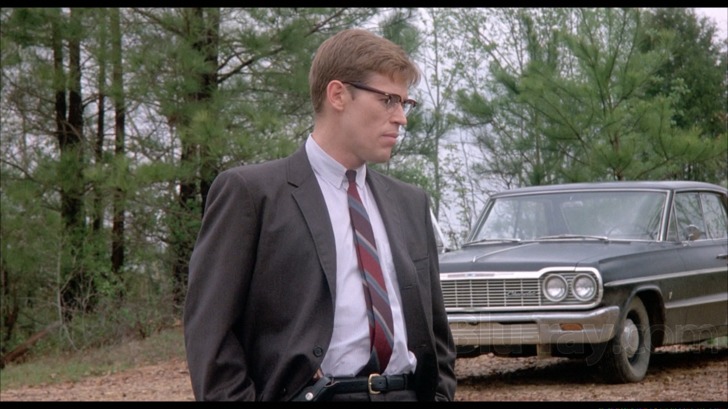
Mississippi Burning is presented on Blu-ray with an AVC encoded 1080p transfer in 1.85:1. Elements have a few fairly minor and transitory issues, with tiny specks and flecks occasionally dotting the premises. Colors generally ring true, with the dusty ambience of backwater Mississippi (sometimes "doubled" by Alabama) providing a kind of drab "scenic beauty." Cinematographer Peter Biziou won an Academy Award for his work on the film, and he does outstanding work in sometimes fairly shaded or outright dark sequences, and this presentation preserves the dusky shadow detail of moments like a Klan cross suddenly lighting up as a threatening totem. As should probably be expected, the more brightly lit sequences pop the best in this presentation, and many of these moments offer very good to excellent detail and fine detail, especially in close-ups. The film has a rather thick grain field, one which spikes appreciably in the aforementioned darker moments. Occasionally resolution of the grain is slightly clumpy looking, especially in shaded and dark environments.
Mississippi Burning Blu-ray Movie, Audio Quality 
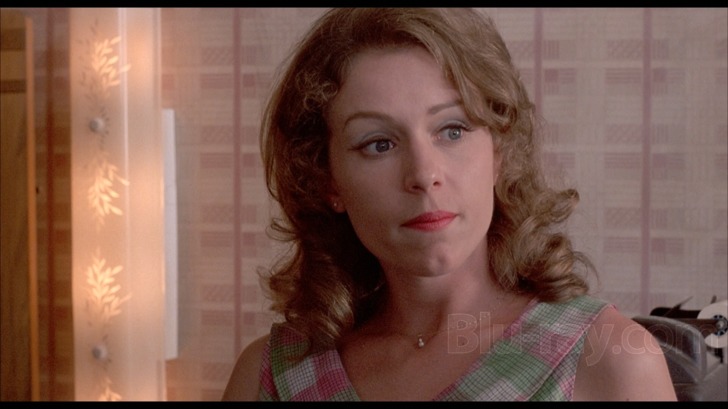
Mississippi Burning features a well articulated lossless DTS-HD Master Audio 2.0 mix, one which provides nicely full bodied support for the musical elements, sound effects (like the rush of flames consuming churches and/or Klan crosses), and dialogue. Prioritization is fine, as is fidelity, on this problem free track.
Mississippi Burning Blu-ray Movie, Special Features and Extras 
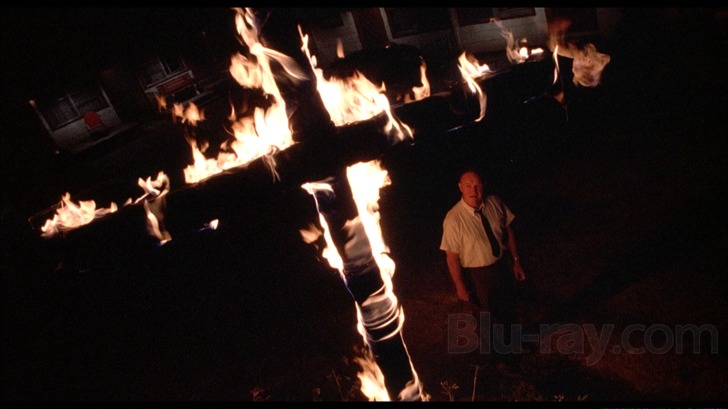
- Audio Commentary features director Alan Parker.
- Isolated Score Track is presented in DTS-HD Master Audio 2.0.
- Original Theatrical Trailer (480i; 1:34)
- MGM 90th Anniversary Trailer (1080p; 2:06)
Mississippi Burning Blu-ray Movie, Overall Score and Recommendation 
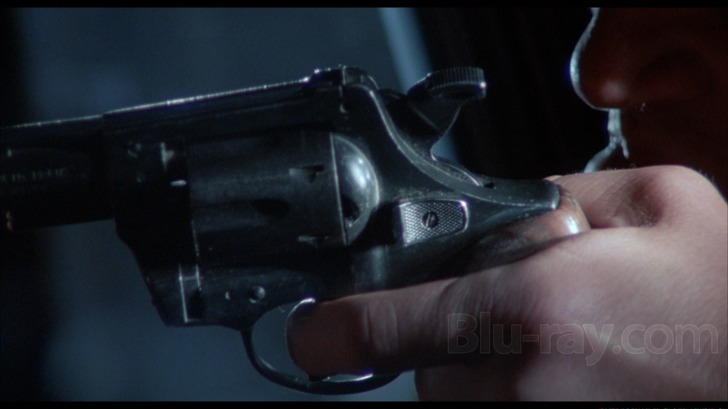
Mississippi Burning isn't especially subtle, but it's often rather shocking. Parker seems to want to make his "politically correct" stance within the context of some questionable violence and tactics on the part of the FBI, two elements which at least partially undercut the more heartfelt sensibilities of the story. Hackman is unforgettable in a role that requires him to ooze menace while ostensibly glad handling the populace, and the large supporting cast, including a steely if downtrodden McDormand, is similarly impressive. The film is probably a bit too "pretty" for its tragic subject, and the final act is ultimately kind of silly. Nonetheless, Mississippi Burning ends up packing a surprising wallop, and with generally excellent technical merits, this release comes Recommended.
Similar titles
Similar titles you might also like

In the Heat of the Night 4K
1967

Twilight
1998

The Defiant Ones
1958

Q & A
1990

The Chase
Limited Edition to 3000
1966

Crossfire
Warner Archive Collection
1947

Death on the Nile
1978

The Ipcress File
1965

Electra Glide in Blue
4K Restoration
1973

Night Moves 4K
1975

The Crimson Kimono
Limited Edition to 3000
1959

The Paperboy
2012

The Parallax View
1974

Bullitt
1968

Obsession
Indicator Series | Limited Edition
1949

The Limey 4K
1999

On Dangerous Ground
Warner Archive Collection
1951

An Inspector Calls
1954

Harper
1966

The Big Clock
1948
